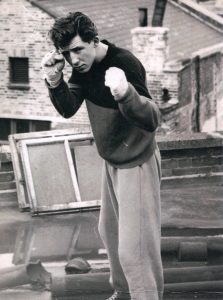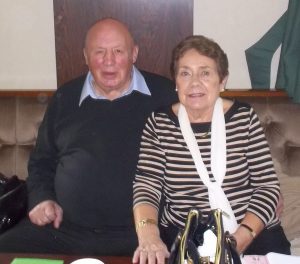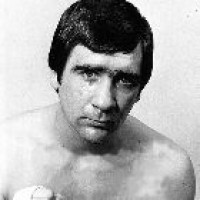
BILLY AIRD (Former British, Commonwealth & European challenger)

British, Commonwealth & European heavyweight contender.
Loveable Liverpudlian, Billy Aird, was born in Merseyside on 15th March 1946. Raised during the post-war years, Billy has only warm memories of his early family life. “I was a war baby, and it was fine. I always got fed, no problem. Everything was lovely. I’ve got four sisters and I was the only lad, so I had to learn how to fight at an early age! I boxed for the Golden Gloves in the Dingle, a famous club in Liverpool. I had around 50 amateur fights and I won over half.”
“I came to London to turn pro in 1969. There was no one up North who was capable of looking after me. When I got down here, I boxed for the Fisher for a while, and Nobby Clarke was my trainer there. Nobby also trained Mickey Carter who was a bantamweight, so Nobby had one of us up here and one of us down there. I hadn’t been in London long when I was walking down the street in New Cross and this fella came up to me. He went ‘All right, Billy?’ I said ‘I’m sorry, I don’t know you,’ and he said ‘My name is Harry Mullan and I follow boxing.’ That’s how me and Harry first met. He was a boxing fan in those days, and he recognised me walking down the street. I’d only been here two minutes, and I thought someone knows who I am already! Although Harry never boxed, he loved his boxing and he knew his boxing inside-out. To my mind, he became the best editor of the Boxing News ever, and he was a really great man.”
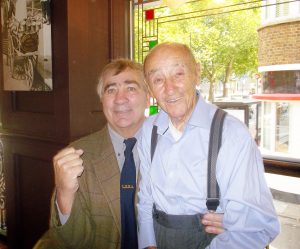
Old pals, Billy Aird and Nobby Clarke.
Billy decided early on in his 46 fight professional career that he was going to manage his own affairs and take his chances in the boxing business. He won the Central Area heavyweight title and challenged for the British, Commonwealth and European belts, and some of those decisions were so painfully close. “I turned professional with John Daly, who ended up a millionaire. He was the man who started Don King off moneywise. John Daly was partners with David Emmons, and they were big time in the film business. John Daly put me with his father as a manager and trainer. He was a nice man, John’s dad, but I just couldn’t work with him. Anyway, Johnny Winter, who was also from Liverpool, used to be in the gym all the time and, after I left Daly’s dad, Johnny looked after me right through my career as a trainer, and we still have a great relationship today. Johnny Winter honestly did care about his fighters, and we always enjoyed ourselves.”
“I probably did better on my own than I would have done with any managers, because I always spoke up for myself and I just worked with who I wanted to work with. I was the first one to put bums on seats for Frank Warren’s shows when he’d only just come into the game. Frank got hold of Joe Bugner and Bugner could get television, whereas I couldn’t. I always wanted to box Bugner, but it never happened. Bugner used to lose his temper when he sparred with me. I think it was because he couldn’t hit me. If he done that in the gym, what would have happened if we’d got into the ring? He’d have gone barmy! He most probably would have got thrown out!”
“I boxed Richard Dunn eight times in total, four as an amateur and four as a pro. Richard Dunn was all right, but he used to try and put the frighteners on people. When I was an amateur, we were at a boxing show and he walked in the dressing room where I was just sitting on my own, and he came over and tried to give it the bigun, so I just jumped up and said ‘Come on, outside now!’ In the amateurs, he beat me four times. But, out of the four, I won at least two of them. Then, in the pros, we boxed and I beat him four out of four, but he got two. There’s no way he beat me! But he was always like a bit of a bogeyman as well. He was awkward. If he fancied it, he was really tough. Sometimes, you’d hit him and he’d go over, and then, other times, you’d hit him and he wouldn’t move. But he was a nice fella, and I think my favourite fight was probably when I stopped Richard Dunn for the Central Area title in Manchester.”
One of Billy’s finest performances was his challenge for the European title against Alfredo Evangelista in Spain. “There were three judges, so that was 45 rounds of scoring and they made nearly 30 even. So those ones that were even, they would have been mine if the fight had happened back home. I really believe I would have stopped him back here. His shorts were up his chest, like a bra! I mean, where are you supposed to hit him when he’s wearing shorts up to there? But I loved boxing, and it took me long enough to get into a position to earn the sort of money I got for the European title fight.”
“When I fought John Gardner for the British and Commonwealth titles, I put him down in the first round. But, when I came out for the second, I could hardly hold my hands up. I’d already boxed 15 rounds against Evangelista. Also, I’d opened a sports shop and a pub, one the week before the fight and one the week after, so I didn’t know whether I was coming or going. I was tired, and John Gardner stopped me in five rounds. I should have forgot about all the other stuff and just concentrated on the fight, but I just took too much on. When I was going to the weigh-in, I was worrying about the sandwiches for the next day.”
“In my last fight, I got hit and I didn’t know where I was. That was against Guido Trane at the Lyceum Ballroom, and he stopped me in five. Me and my wife, Angela, went away the next day on holiday and, two days later, I was walking along the prom in Spain and I just stopped and grabbed the railings. My head was spinning round. So I stayed still, and my head cleared and then it all came back to me. I’d been concussed for two days! I never, ever boxed again after that. When you’re younger, they bounce off you. But, when you get to a certain age, where they used to bounce, this one hurt me and I’d never been hurt in my life, so that was it for me. I suppose I was lucky, because I didn’t go through a bad time when I retired really, not like some fighters do. I was sensible, because I knew where I was going and Angela was made up that I was out of it, because it’s a hard game. I had money and I put my money to work. So I’ve had a good life and I’ve got no complaints.”
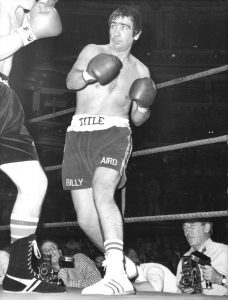
Challenging John L Gardner for the British & Commonwealth heavyweight titles.
